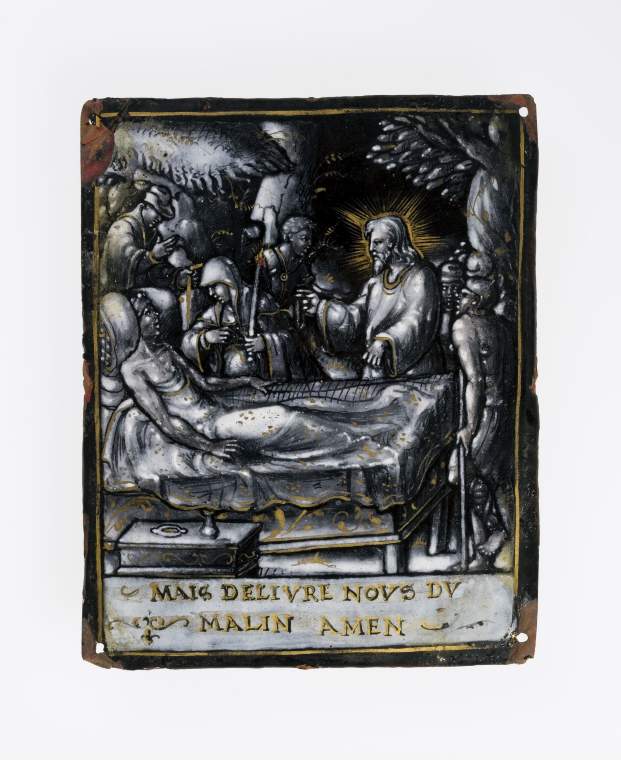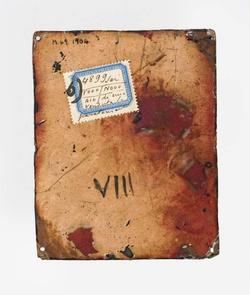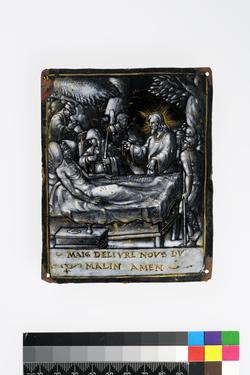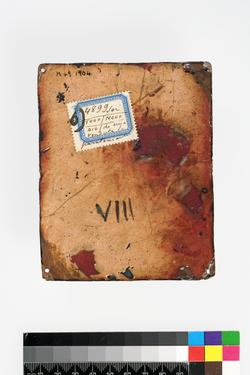Current Location: In storage
Titles
The Lord's Prayer VIII Christ visiting a Sick or Dying Man
Maker(s)
Maker:
Nouailher, Colin
Printmaker:
Monogrammist C. V.
(After)
Designer:
Holbein, Hans, the younger
(After)
Entities
Categories
Description
Rectangular copper plaque enamelled en grisaille with a little pink and red, and gilded. Christ visiting a dying man. Inscribed below MAIS DELIVRE NOVS DV’/two shallow scrolls with fleur-de-lys below, ‘MALIN AMEN’ (But deliver us from evil, Amen). One of a set with M.49A-E-1904.
Rectangular convex copper plaque with a hole in each corner, enamelled en grisaille with some pink and a spot of red, on a black ground, and gilded. Clear, uneven counter-enamel with several blobs in the middle of the right side, and near to the lower left and lower right corners. An outdoor setting with trees on the right and in the centre. A sick or dying man lies propped up on cushions on a bed covered by a blanket. He looks towards Christ, who stands behind bed. A lame man stands at its end. A woman wearing a cloak over her head stands or sits beside the bed close to the invalid holding a candle with a red flame. Behind and to the left is a man wearing a hat, and a younger bare-headed man moves towards the centre. In the left foreground in front of the bed, is a small table decorated with gold scrolls, with a dish and a jar on it. Across the bottom of the plaque is a white panel inscribed in black and gold,‘MAIS DELIVRE NOVS DV’/two shallow scrolls with fleur-de-lys below, ‘MALIN AMEN’ (But deliver us from evil, Amen). A gold line runs round the scene and inscription. The reverse is inscribed in black with the number ‘VIII’. The plaque is set in an ill-fitting, rectangular, gilt-metal frame with repeating formal leaf border. The plaque is held into the frame by four bent over pins attached to the cardinal points on the reverse.
Notes
History note: Uncertain; possibly Robert Napier, West Shandon, Dunbartonshire by 1865; sold Christie’s, 5 June, 1877, one of six plaques in lot 2594; sold to Stettiner. Or, although smaller, G.H. Morland; sold Christie's, 10 May 1866, one of six plaques in gilt-metal frames in lot 437. An unidentified French sale in which the six plaques formed lot 289. An unidentified Italian owner or dealer before or after the sale. Frank McClean, MA, FRS (1837-1904), Rusthall House, near Tunbridge Wells
Legal notes
Frank McClean Bequest
Acquisition and important dates
Method of acquisition: Bequeathed
(1904)
by
McClean, Frank
Dating
16th Century, Mid
Circa
1540
CE
-
Circa
1550
CE
Note
This plaque originally formed part of a set of eight illustrating the Lord's Prayer, of which six are in the Fitzwilliam (M.49A-F-1904). The first shows ' Christ instructing the Disciples how to pray' (Matthew, VI, 6-8), the others have scenes associated with the seven petitions of the Lord's Prayer which follow (Matthew VI, 9-13). The last, 'But deliver us from evil, Amen' (Matthew VI, 13) is illustrated by Christ curing a sick or dying man. The choice of this image indicates that the words were interpreted as a petition for deliverance from worldly misfortune, such as sickness, as well as from past or future sin. This image was appropriate for this petition of the prayer because in the Gospels the miraculous cures effected by Christ were sometimes followed by him granting the sufferers forgiveness of their sins.
Two Lord's Prayer plaques in similar style in the Louvre were attributed to Colin Nouailher by Alfred Darcel (1867) and this was upheld by J.J. Marquet de Vasselot (1919-20) and Sophie Baratte (2000). This attribution was confirmed by the presence of the initials CN below the title on a Lord’s Prayer plaque decorated with the 'Deliver us from Evil' scene, acquired by the Musée de l’Évêché (now the Musée des Beaux-Arts), Limoges, in 2007 (2007.5.2) with another plaque of the 'Give us our daily bread' scene (2007.5.1).
The scenes on Nouailher's plaques were inspired by a set of metalcuts by the Basel monogrammist C.V. after Hans Holbein the Younger which appeared in Desiderio Erasmus's 'Precatio dominica in septem portiones', (The Lords Prayer in seven parts) published by both Johann Froben and Johannes Bebel successively in Basel in Switzerland in 1524. The work was first published in Basel without illustrations in 1523, and was rapidly translated into modern European languages. The illustrations in the Froben and Bebel editions have the inscriptions in Latin, but a set of eight prints issued separately, probably a little later, with inscriptions in French, signed CV, is in the British Museum (1904.0206, 64,1-8;) and seven of the set (no. 4 is missing) are in the Cabinet des Estampes, Bibliothèque nationale, Paris (EA 25c in fol., p. 57). Possibly they were intended for a French illustrated edition which was never published. While the iconography of all the plaques was derived from these illustrations, the scenes were transposed (left to right) and details differ considerably, in some scenes more than others.
Sets of Lord's Prayer plaques were also executed probably by Jean II or III Pénicaud, and an enameller who signed 'KIP'. These are in very different styles from the Nouailher plaques and include two scenes which were not based on the Holbein/CV illustrations.
School or Style
Renaissance
People, subjects and objects depicted
Components of the work
Decoration
composed of
enamel
( white, pink, red, and black)
gold
Plaque
composed of
copper
Height 12 cm
Width 9.6 cm
Frame
Height 13.4 cm
Width 10.6 cm
Inscription or legends present
Inscription present: between the words, two shallow scrolls with fleur-de-lys below
- Text: MAIS DELIVRE NOVS DV’ and ‘MALIN AMEN'
- Location: On front
- Method of creation: Painted in black and gold
- Type: Inscription
Inscription present: Roman eight
- Text: VIII
- Location: On back
- Method of creation: Painted in black
- Type: Number
Inscription present: rectangular with serrated edges, and printed blue beaded border;
- Text: 6)4899Ser/ T000/N000/A10 di una/venduta se[arata ]? mente
- Location: On back
- Method of creation: Hand-written in black
- Type: Label
References and bibliographic entries
Related exhibitions
Identification numbers
Accession number: M.49F-1904
Primary reference Number: 156440
Stable URI
Audit data
Created: Saturday 6 August 2011
Updated: Sunday 3 March 2024
Last processed: Thursday 14 August 2025
Associated departments & institutions
Owner or interested party:
The Fitzwilliam Museum
Associated department:
Applied Arts

 IIIF Manifest
IIIF Manifest






